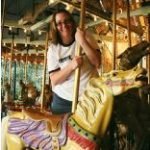
I wasn’t going to get emotional about this, but when Barista Magazine Publisher Kenneth Olson and I walked off the plane at Logan Airport in Boston, I was suddenly overcome with memories. He encouraged me to write what follows.

These things happened here 10 years ago: ¢ I attended my very first SCAA show
¢ The first official United States Barista Championship took place (in 2002, the North American Barista Championship happened, and Dismas Smith won, but it was later renamed).
¢ Heather Perry won the USBC at the SCAA in Boston. The very next day, she competed in the World Barista Championship, in a tiny room with maybe 30 seats. Against baristas from around the world, Heather placed 13th.
Also:
¢ I fell in love with the barista community.
At the time, I worked as an editor for another coffee magazine. I was thrilled to attend the SCAA show for the first time, and I’d seen a regional barista competition before (back then there were only three regions), and had thought it was pretty cool. But when I walked into the Welcome Reception that first night of the SCAA show in 2003, and then-reigning World Barista Champion Fritz Storm walked past me, I almost fell over. I was completely star struck.

Suddenly, I had a game plan: I was all about the baristas. I started the next day by attending a seminar by Norwegian Tone Liavaag and Icelander Sonja Grant (two of the original folks who came up with the idea for barista competitions in the first place), about how barista competitions worked, and why they might be a good way for companies to market their coffee. Maybe 6 people attended the session. People didn’t give much thought to baristas back then.

But I was hooked. I spent every moment I could at the barista competitions ”and you read that right above: the USBC took place for two days (no semifinal round back then), and the World Barista Championship the two days after that. By the end of it, I’d met and befriended a lot of the international competitors and learned about how popular barista competitions were in their countries, especially Scandinavian powerhouses Norway and Denmark, which had until then won all the WBCs. (To be fair, this was only the fourth one.)

Aussie Paul Bassett broke the mold by switching up the winning countries, and he took home gold from the 2003 WBC. I interviewed him right after the win over beers, and he told me about how he had hired a sports therapist to help him train, that he had given his whole life over the working towards the WBC crown. I was stunned ”I’d never heard imagined it could be quite so serious.

That conversation with Paul took place on a Sunday, and by Monday, I was back in the office trying to sell the head editor on an entire article about barista competitions and why they’re important ”why people should care. I wanted to write about how baristas had the potential to be the future of the industry, the trendsetters, the game-changers, the business owners. She let me do it, and that article ”the first ever published about barista competitions ”appeared in the June 2003 issue of that magazine. And two years later, Ken and I had started publishing Barista Magazine.
So I’m choked up being here. This was an enormous starting point for me. It’s wonderful to be back.

